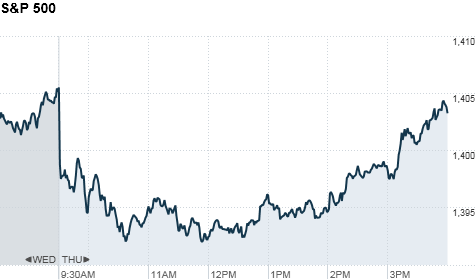NEW YORK (CNNMoney) -- U.S. stocks drifted lower but rebounded in later trading Thursday to end at nearly breakeven.
A string of weak economic reports -- including jobless claims that fell below expectations -- failed to inspire investors to move off the sidelines.
Both the S&P 500 and the Nasdaq closed in the red for the third straight day, while the Dow broke a two-day losing streak.
The Dow Jones industrial average (INDU) added 20 points, or 0.2%. The S&P 500 (SPX) dropped 2 points, or 0.2%. The Nasdaq (COMP) was down 10 points, or 0.3%.
Even with a few days of losses, all three indexes are up more than 10% in 2012. But investors are continuing to seek economic reports that beat expectations in order to justify that run up.
On Thursday the number of Americans filing for unemployment benefits only narrowly missed economists' forecasts, but that still pushed stocks mostly lower.
U.S. economy to outpace Europe
"There's a general sense in the market that we're at lofty levels, so investors get worried when disappointments pop up," said Bruce McCain, chief investment strategist at Key Private Bank.
The week has been filled with a string of disappointing economic numbers on durable goods orders, consumer confidence and home prices. Ongoing concerns about a growth slowdown in China have added pressure on world markets.
"I think, overall, the market has had a good run, and investors are trimming some exposure," said Paul Powers, head of U.S. equity trading at Raymond James.
Most large financial stocks dropped more than 1% Thursday, including Bank of America (BAC, Fortune 500), JPMorgan Chase (JPM, Fortune 500), Citigroup (C, Fortune 500), Morgan Stanley (MS, Fortune 500) and Goldman Sachs (GS, Fortune 500).
While stocks are suffering, the initial public offering market has been buoyant and is on track for a record week with 10 companies set to debut.
Still, it was a mixed bags for the three companies that started trading Thursday. Millennial Media's (MM) shares nearly doubled, but T-shirt maker Cafe Press (PRSS) ended the day roughly flat after an initial surge. Both companies priced above their initial trading range. Merrimack Pharmaceuticals (MACK) ended the day down roughly 14% after it started trading.
Stocks closed in the red Wednesday amid worries about slowing growth overseas and in the U.S.
Economy: First-time claims for unemployment benefits in the week ended March 24 fell to 359,000 -- a four-year low -- from 364,000 the previous week. But that was still higher than the 350,000 forecasted.
U.S. gross domestic product -- the broadest reading of economic growth --increased at an annual rate of 3% in the fourth quarter, according to the Bureau of Economic Analysis. That was the third revision, and was in line with analysts' estimates.
Companies: Best Buy's (BBY, Fortune 500) stock dropped after the company narrowly missed expectations and said it would close 50 stores.
Sears Holdings' (SHLD, Fortune 500) stock rose but closed lower on reports that the retailer was shopping its Lands' End brand for $2 billion.
Like a bear in a China shop
Red Hat's (RHT) stock jumped after the software maker reported quarterly earnings that beat expectations and a stock buyback of $133 million.
Research in Motion (RIMM) shares dropped after hours as the BlackBerry maker missed expectations on revenues and earnings. The company said it's considering strategic alternatives, and one director left its board.
World markets: European stocks closed down. Britain's FTSE 100 (UKX) was off 1.2%, the DAX (DAX) in Germany lost 1.8% and France's CAC 40 (CAC40) was down 1.4%.
Asian markets ended lower. The Shanghai Composite (SHCOMP) declined 1.4%, the Hang Seng (HSI) in Hong Kong dropped 1.3% and Japan's Nikkei (N225) lost 0.7%.
Currencies and commodities: The dollar lost ground against the Japanese yen, but strengthened against the euro and the British pound.
Oil for May delivery slipped $2.63 to $102.78 a barrel.
Gold futures for April delivery rose $2.20 to $1,660.40 an ounce.
Bonds: The price on the benchmark 10-year U.S. Treasury rose, sending yields down to 2.16% from 2.20% late Wednesday.

No comments:
Post a Comment